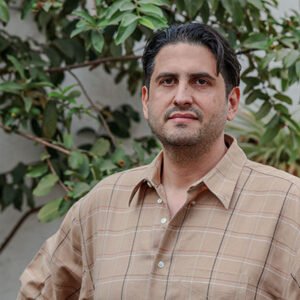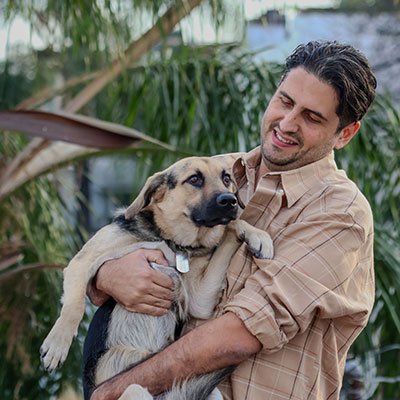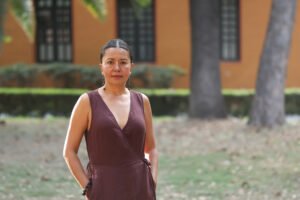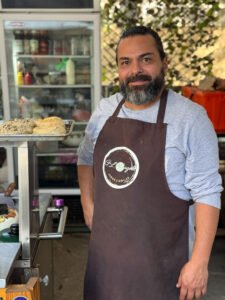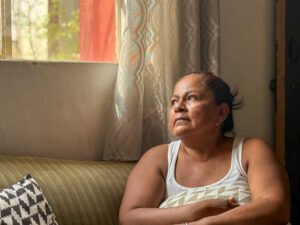
What if one moment could change the course of your life forever?
“So, I decided to climb the hill. I walked for many kilometers and when I made it to the top, I saw all of Mexico. That moment transformed me somehow—it allowed me to step away from everything and see it from above: my life, the country, where I was… I believe that, from that moment on, I began to make different decisions in life.”
Antonio’s story begins with two iconic figures: his great-grandfathers. One was a revolutionary who fought alongside Pancho Villa; the other, a French immigrant who came to Mexico seeking a new beginning. Through these two men, Antonio learned something essential: that our roots are complex, and our perspectives are shaped by those who came before us.
“When I knew him, he was already a politician. I believe he had been a congressman and held many political positions. He was part of what was then called ‘Fuerzas Vivas’ (living forces), the combatants of the Revolution who survived and were still alive.
I remember small things about him… I remember that he carried a gun. He always carried his gun, which is unheard of in Mexico now, but back then, he always had it with him. He had his ‘grandfather room,’ a smoking and drinking lounge for him and his friends where we were never allowed. It was very elegant, adorned with paintings of his party and commemorations for his participation in the Revolution. That was a significant part of the history of Mexican society: the ‘fuerzas vivas’ and how the PRI (Institutional Revolutionary Party) was formed, ruling for 70 years.
But at the same time, he would tell us stories, stories from the countryside. He knew many tales about ‘Uncle Rabito,’ a rabbit who got into trouble on the farm. Who knows—perhaps he fought hard and lived a tough life, but I knew him as my grandpa.”
“On the other side, my grandfather was completely on the opposite spectrum. He came to Mexico as part of a famous group of French immigrants from Barcelonette. I never met him, but I always imagined him as adventurous, cultured, and with a complicated romantic life. That side of my family pulled me toward poetry, art, and sensitivity in a way. Even though I didn’t know him, his stories made me curious about the world. Knowing I had roots elsewhere made me eager to learn more about others.”
As he grew up, Antonio traveled across the country and experienced moments that transformed his view of Mexico and its people. One unforgettable experience was a trip to Oaxaca when he was just 18 years old.
“When I arrived in Mexico City, I was mugged and lost all my money. But I decided to continue to Oaxaca. I slept on the streets, begged for food, and made friends who fed me. At one point, I was on the highway and saw a hill. I asked the driver to let me off, saying, ‘I want to get off here.’ So I climbed the hill, walking kilometers until I reached the top. From there, I saw all of Mexico. That moment transformed me somehow—it allowed me to step away from everything and see it from above: my life, the country, where I was. I didn’t think much; I just felt immense happiness and peace. It was as if I found my own place amidst the vastness of the country. I believe that when I came down, my life had a new path and destiny.”
Antonio’s story offers a unique lens through which to explore the city’s many layers. Over the years, he has immersed himself in the diverse realities and stories of its people, building connections that transcend social and economic divides.
“Guadalajara has many layers, realities, and societies. Some people have immense resources, but many don’t have access to opportunities or basic services like adequate healthcare. That affects society in many ways. Living here for so many years, I’ve seen many parts of the city, met many people, and heard countless stories. Each represents what it means to be Mexican. In everyone I’ve met and every place I’ve been, I see reflections of other parts of the country’s culture. Guadalajara has become my cultural map of what it means to be Mexican. From here, I feel Mexican.
“First and foremost, being Mexican is about joy. We seek joy at any cost and laugh at everything—our misfortunes, others’ misfortunes. My way of connecting with other Mexicans is always through jokes, laughter, and play. Then, there’s warmth and hospitality. Everywhere I’ve gone—at least for me, and I hope for others—it’s been welcoming. I know racism and classism exist in Mexico; I’ve experienced or even been part of it. But in general, wherever I’ve traveled, I’ve felt good with the people of Mexico. It’s like family—it’s my place, my home.”
Antonio also shared how he’s found new perspectives through his work with migrants and refugees at a shelter in Guadalajara. This work has allowed him to connect with people from all over the world and reflect on how helping others has also transformed him.
“It has been such a beautiful experience because you meet so many people. I’ve made many friends, and everyone there shares the same goal: to ensure that those who are traveling can live with dignity, reach their destination, have a better life, and achieve their dreams.
“Due to the nature of the shelter, you focus on the people who are there in the moment, in the present—helping them in that moment to eat, to be well, to solve problems, whatever you can do for them. Then they leave, and you rarely find out what their destiny was. But recently, I attended an event where they showed us some videos of people who had reached their destination, who were very happy and sent their thanks for making it.
“And yes, I realized that you are indeed impacting families, lives, and stories. Being a small part of a family’s story that changed their destiny, and knowing that you helped them even a little in a positive way, is incredibly gratifying. I have no idea of the full impact I might have had, but I believe that even the little I’ve done has made a difference.
When talking about the future, Antonio has hope in the younger generations. He sees in them the essential, positive change that Mexico needs, especially in movements like feminism, environmental advocacy, and social inclusion.
“I find it incredibly hopeful to see young women and men participating and continually growing the movement, taking action, and transforming society. When it comes to gender issues, I feel that this generation is much more open, and I think that has a very positive impact, especially in helping to bring peace to society. Being more accepting of others and our differences.
“I also see them concerned about environmental issues, economic matters, social and political topics, and I believe they are organizing themselves well. Not just as movements or initiatives, but within society itself, they are adopting really admirable values.”
His own son has inspired and helped him understand the significance of prescenes and taking action.
“He has taught me a lot about ways to get involved. For example, he was very involved in the movement that renamed the Glorieta de los Niños Héroes to the Glorieta de los Desaparecidos. A few years ago, he conducted research on the new buildings being constructed in the city and how they were left uninhabited. They went to document several buildings, investigate who built them, how many people were actually living there, and whether they were being used as residences or just as value storage. He then published an article, which sparked a small movement in the city of people coming together to discuss these issues.”
And of course, we couldn’t talk about Mexico without mentioning tequila. For Antonio, tequila is much more than a drink. It’s a bond that brings people together.
“What I do know is that I’ve made many friends over tequila and a bottle, and I have great memories of conversations like this—sharing a bottle and a shot glass, talking all night until dawn. Tequila has always been there for me, and when I travel to Australia or another country and meet new friends, I bring them a few bottles of tequila, you know, and teach them how to drink it. Because in many countries, they don’t know how to drink it. Oh, and I think it’s a symbol. It’s a symbol. It’s a Mexican symbol.”
When asked about his favorite tequila he said,
“I think the best tequila is the one you like the most. Right now, I have a bottle of Tierra Noble Blanco and I like that one a lot. They make it in small batches… Tierra Noble Blanco.”
Antonio’s personal advice to the future and all of us?
“We need to be curious and we need to be kind towards people’s differences. Sometimes it’s annoying, sometimes it makes us angry, sometimes it makes us sad, but it’s worth approaching others, trying to understand them, and having empathy.”
Antonio has shown us how, through generations, perspectives, and change, we can rediscover what it means to be Mexican. It’s a story of warmth, resilience, and hope. And it’s also a reminder that Mexico isn’t just its past or present, but also the future we can build together.
